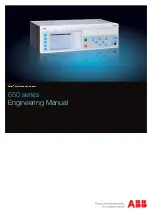
2
ES-200X Series Manual —
P/N LS10131-000FL-E:C 7/25/2018
Fire Alarm & Emergency Communication System Limitations
While a life safety system may lower insurance rates, it is not a substitute for life and property insurance!
An automatic fire alarm system
—typically made up of smoke
detectors, heat detectors, manual pull stations, audible warning
devices, and a fire alarm control panel (FACP) with remote notifica-
tion capability—can provide early warning of a developing fire. Such
a system, however, does not assure protection against property
damage or loss of life resulting from a fire.
An emergency communication system
—typically made up of an
automatic fire alarm system (as described above) and a life safety
communication system that may include an autonomous control
unit (ACU), local operating console (LOC), voice communication,
and other various interoperable communication methods—can
broadcast a mass notification message. Such a system, however,
does not assure protection against property damage or loss of life
resulting from a fire or life safety event.
Smoke detectors
may not sense fire where smoke cannot reach
the detectors such as in chimneys, in or behind walls, on roofs, or
on the other side of closed doors. Smoke detectors also may not
sense a fire on another level or floor of a building. A second-floor
detector, for example, may not sense a first-floor or basement fire.
Particles of combustion or “smoke”
from a developing fire may
not reach the sensing chambers of smoke detectors because:
•
Barriers such as closed or partially closed doors, walls, chim-
neys, even wet or humid areas may inhibit particle or smoke
flow.
•
Smoke particles may become “cold,” stratify, and not reach the
ceiling or upper walls where detectors are located.
•
Smoke particles may be blown away from detectors by air out-
lets, such as air conditioning vents.
•
Smoke particles may be drawn into air returns before reaching
the detector.
The amount of “smoke” present may be insufficient to alarm smoke
detectors. Smoke detectors are designed to alarm at various levels
of smoke density. If such density levels are not created by a devel-
oping fire at the location of detectors, the detectors will not go into
alarm.
Smoke detectors, even when working properly, have sensing limita-
tions. Detectors that have photoelectronic sensing chambers tend
to detect smoldering fires better than flaming fires, which have little
visible smoke. Detectors that have ionizing-type sensing chambers
tend to detect fast-flaming fires better than smoldering fires.
Because fires develop in different ways and are often unpredictable
in their growth, neither type of detector is necessarily best and a
given type of detector may not provide adequate warning of a fire.
Smoke detectors cannot be expected to provide adequate warning
of fires caused by arson, children playing with matches (especially
in bedrooms), smoking in bed, and violent explosions (caused by
escaping gas, improper storage of flammable materials, etc.).
Heat detectors
do not sense particles of combustion and alarm
only when heat on their sensors increases at a predetermined rate
or reaches a predetermined level. Rate-of-rise heat detectors may
be subject to reduced sensitivity over time. For this reason, the rate-
of-rise feature of each detector should be tested at least once per
year by a qualified fire protection specialist. Heat detectors are
designed to protect property, not life.
IMPORTANT! Smoke detectors
must be installed in the same
room as the control panel and in rooms used by the system for the
connection of alarm transmission wiring, communications, signal-
ing, and/or power. If detectors are not so located, a developing fire
may damage the alarm system, compromising its ability to report a
fire.
Audible warning devices such as bells, horns, strobes, speak-
ers and displays
may not alert people if these devices are located
on the other side of closed or partly open doors or are located on
another floor of a building. Any warning device may fail to alert peo-
ple with a disability or those who have recently consumed drugs,
alcohol, or medication. Please note that:
•
An emergency communication system may take priority over a
fire alarm system in the event of a life safety emergency.
•
Voice messaging systems must be designed to meet intelligibility
requirements as defined by NFPA, local codes, and Authorities
Having Jurisdiction (AHJ).
•
Language and instructional requirements must be clearly dis-
seminated on any local displays.
•
Strobes can, under certain circumstances, cause seizures in
people with conditions such as epilepsy.
•
Studies have shown that certain people, even when they hear a
fire alarm signal, do not respond to or comprehend the meaning
of the signal. Audible devices, such as horns and bells, can have
different tonal patterns and frequencies. It is the property
owner's responsibility to conduct fire drills and other training
exercises to make people aware of fire alarm signals and
instruct them on the proper reaction to alarm signals.
•
In rare instances, the sounding of a warning device can cause
temporary or permanent hearing loss.
A life safety system
will not operate without any electrical power. If
AC power fails, the system will operate from standby batteries only
for a specified time and only if the batteries have been properly
maintained and replaced regularly.
Equipment used in the system
may not be technically compatible
with the control panel. It is essential to use only equipment listed for
service with your control panel.
Telephone lines
needed to transmit alarm signals from a premises
to a central monitoring station may be out of service or temporarily
disabled. For added protection against telephone line failure,
backup radio transmission systems are recommended.
The most common cause
of life safety system malfunction is inad-
equate maintenance. To keep the entire life safety system in excel-
lent working order, ongoing maintenance is required per the
manufacturer's recommendations, and UL and NFPA standards. At
a minimum, the requirements of NFPA 72 shall be followed. Envi-
ronments with large amounts of dust, dirt, or high air velocity require
more frequent maintenance. A maintenance agreement should be
arranged through the local manufacturer's representative. Mainte-
nance should be scheduled as required by National and/or local fire
codes and should be performed by authorized professional life
safety system installers only. Adequate written records of all inspec-
tions should be kept.
Limit-D2-2016
Содержание ES-200X
Страница 137: ...ES 200X Series Manual P N LS10131 000FL E C 7 25 2018 137 Notes ...
Страница 164: ...164 ES 200X Series Manual P N LS10131 000FL E C 7 25 2018 ...
Страница 166: ...Cut along dotted line ...
Страница 168: ...One Fire Lite Place Northford CT 06472 1601 USA USA Phone 203 484 7161 Canada Phone 905 856 8733 www firelite com ...



































